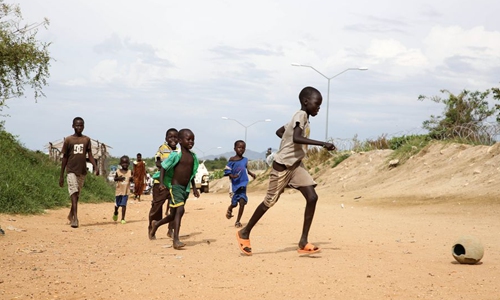HOME >> WORLD
UNICEF calls for urgent action to end child abuse in South Sudan
Source:Xinhua Published: 2019/11/19 11:48:12

Women carrying food donation delivered to them by World Food Programme (WFP) in Dome, South Sudan, Oct. 4, 2018. (Xinhua/Gale Julius)
The United Nations Children's Fund (UNICEF) on Monday called for urgent action to end abuse and exploitation of children in South Sudan.
In a new report titled "Child at a Crossroads" released in Juba, UNICEF said children in South Sudan are some of the most disadvantaged in the world and who are yet to see their rights fulfilled.
The report said South Sudan continues to have one of the highest child mortality rates in the world with one in ten dying before the age of five, mostly due to preventable diseases and lack of health care.
"The report UNICEF is launching today has a clear message; if there is a will there is a way to change children's futures. I know there is the will among the government officials, UN agencies and partners, now, let's find the way," Mohamed Ag Ayoya, UNICEF Representative in South Sudan said in a statement issued in Juba.

File photo shows refugee children playing games at a refugee camp in Juba, South Sudan, on Nov. 16, 2015. (Xinhua/Pan Siwei)
The report was released ahead of the 30th anniversary of the UN Convention on the Rights of the Child (CRC), which was ratified by the east African country on January 23, 2015.
It finds that children in South Sudan are suffering from abuse and exploitation related to social norms, harmful practices and insecurity, with an estimated 45 percent of all women married before the age of 18, placing the world's youngest nation as one of the countries with the highest prevalence of early marriage in the world.
In order to accelerate progress in advancing child rights, the report calls for more data and evidence to scale up proven solutions and interventions such as expanding resources, involving young people in co-creating solutions and applying the principles of equity and gender equality in programming.
RELATED ARTICLES:
Posted in: AFRICA